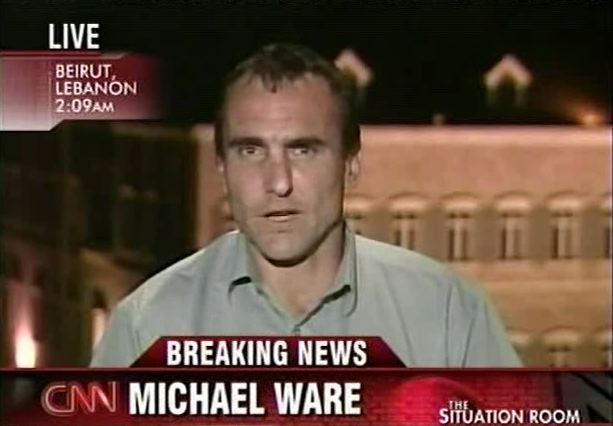TSR: More on Baalbeck operation

Click photo to play
Length: 4:07
WOLF BLITZER: To our viewers: you’re in The Situation Room, where new pictures and information are arriving all the time. Standing by: CNN reporters across the United States and around the world to bring you tonight’s top stories.
Brent Sadler is standing by in Nakoura, Lebanon. Also, Michael Ware is in Beirut, but let’s go to Northern Israeli first. John Roberts is watching the situation from very close to the Lebanese border. John?
Let's go to Beirut. We'll come back to Brent in a moment. Michael Ware is our reporter in Beirut, watching all of this unfold. It looks, at least to those of us who are watching this from afar, Michael, that the Israeli military -- thousands of troops either are or will shortly be moving into south Lebanon.
The air war about to resume full speed ahead as far as Israel is concerned. And at the same time, Israeli troops moving all the way north to Baalbeck not far from the Syrian border in some sort of operation that is unfolding right now. Give our viewers a sense, what are you hearing about what is happening first of all in Baalbeck?
MICHAEL WARE, CNN CORRESPONDENT: Well, Wolf, this is a fascinating development that is happening this evening in Baalbeck. This is a new form of operation that we haven't so far seen in the campaign by the Israeli military. This very much is a deep strike kind of operation. Most likely working on actionable intelligence. Perhaps they have some very specific information and are moving on a target, be it to interrupt a command and control center, to hit a particular arsenal or perhaps after a high profile target, a high value target. What we're hearing now is Lebanese military sources are confirming that Israeli troops entered a hospital in northern Baalbeck where they went inside and checked the identity cards and papers of all the hospital staff and all of the patients.
Now what we're hearing is that military sources again say the fighting continues, but on local media and on Arab channels, what the news is, is that the Hezbollah forces are claiming to have this group of Israeli soldiers or commandos as they're being described surrounded, certainly engaged in heavy combat -- Wolf.
BLITZER: Michael, stand by for a moment. I think we have re- established our contact on the phone with Brent Sadler. He's in Naqoura.
BLITZER: All right, Brent, I'm going to interrupt for a moment, Brent, because your line is coming in and out. Stand by for a moment, Brent. We're going to fix that connection that you have. Michael Ware -- let's go back to Michael in Beirut. Earlier in the day the Israelis said that over these nearly three weeks, the Hezbollah were firing about 100 or 150 rockets a day, Katyushas mostly into northern Israel. Yesterday it went down to only three or four and today it's less than a dozen at least so far. What if anything should we read into this?
WARE: Well, this is very difficult to get a fix on as you can well imagine, Wolf. This could be one of any number of things. First, the most obvious is that there's been some degrading of Hezbollah's capability to launch extended operations to strike within Israel, either their arsenals have been hit or their supplies, their chains have been hit or simply that they're incapable of establishing the launch sites.
The other thing is perhaps a political play in that during this 48-hour cessation of air strikes by the Israelis within southern Lebanon, perhaps Hezbollah was calculating that to play to their constituency they had to be seen not to be going on the offensive either to give a clear run for whatever evacuations could take place or for whatever aid to arrive. So it could be any manner of things at this stage -- Wolf.
BLITZER: Michael Ware in Beirut, Brent Sadler in Naqoura in southern Lebanon. We're going to get back to both of you. Lots of news unfolding.
